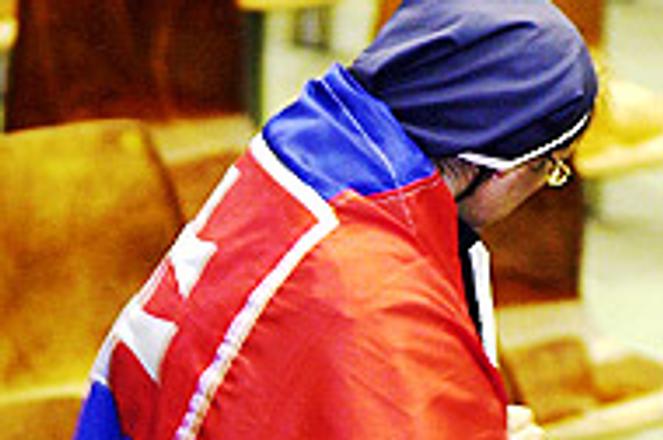PILGRIMS thanked the Pope for visiting Slovakia. Politicians chose to point fingers over attendance.photo: TASR
ABOUT 3,500 pilgrims, the country's bishops, President Rudolf Schuster, and several members of parliament visited the Pope on February 14 to thank him for his third visit to Slovakia since his pontificate. The Pope came to Slovakia shortly after the fall of communism, later in the mid 1990s, and most recently in September 2003.
At an audience in the Vatican, the 83-year-old John Paul II gave a 10-minute speech in which he appealed to Slovakia to bring their faith and human and spiritual values into the European Union, which Slovakia will enter in May 2004 along with nine other countries.
The pontiff also mentioned the need for a reference to European Christian heritage in the EU's constitution.
The visit was marked by political controversy in Slovakia, as ruling officials refused to accept invitations to the pilgrimage, arguing that the president, who is running for re-election in the upcoming race in April, would misuse it for his campaign.
The Catholic Church of Slovakia invited all three top constitutional officials; Schuster, PM Mikuláš Dzurinda, and Speaker of Parliament Pavol Hrušovský. The latter was already scheduled to be outside of the country and Dzurinda could not come because his party, the Slovak Democratic and Christian Union, had scheduled a meeting of its presidium. Another of the party's MPs said he could not go for family reasons.
Other ruling MPs who received invitations were more straightforward in articulating their reasons for refusing.
"Our caucus has decided that we will not have a representative in the pilgrimage. We consider the event to be a part of the president's campaign," said Gyula Bárdos, head of the Hungarian Coalition Party parliamentary caucus.
Particularly surprising was the refusal of Christian Democrats (KDH) to participate in the Vatican trip.
The KDH is arguably the country's most pro-Christian political group and has lobbied for many legislative changes that liberals and non-believers have often perceived as an effort to impose Catholic principles on the state. One case was the recently approved law obliging school children to either attend religion or ethics lessons.
The KDH was also the main driving force in support of special bilateral treaties with the Vatican.
But for the KDH, the threat that the president would use the trip to flash his political interest in re-election was a strong reason to stay home.
KDH deputy chairman Pavol Minárik said: "We see this [trip] as part of [Schuster's] presentation as a presidential candidate and we don't want to be a part of that."
To many politicians, Schuster's communist past also remains a problem.
Minárik told the private news agency SITA on February 10 "Schuster does not have the moral right to lead a pilgrimage of Slovak Catholics."
But Slovak bishops have criticised such attitudes, dubbing them provincial.
In an official statement, archbishop Ján Sokol said, "Slovak politicians have again showed that it is not in their power to unite in the interest of a dignified representation of their country."
Bishops refused the allegations that the trip's timing had anything to do with the presidential elections. They argued that February 14 was picked as the day when Catholics celebrate Patron Saints Constantine and Methodius.
After returning from the Vatican, Schuster repeated that he was sorry the politicians had refused to go to the Holy See.
"Not a single word of politics was spoken," he said.
"The Pope and the Vatican, that is not politics, it is much more," Schuster said.
In a short address to the pontiff during the audience on February 14, Schuster spoke of the ecumenical dialogue of various denominations in Slovakia.
"It is good that you exist. The world needs you. The world needs love, dialogue, forgiveness, and tolerance. Slovakia is and will be with you," Schuster told John Paul II.


